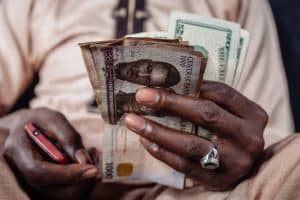
The Nigerian naira took a steep dive on Thursday afternoon, hitting N1,450 per dollar in the parallel market, marking an 8.28% decline or a N120 difference from the earlier rate of N1,330 reported yesterday morning.
Data sourced from currency traders confirmed this downward trend, indicating the currency’s ongoing volatility.
According to Bureau De Change (BDC) operators, the purchase rate stood at N1,350, with an approximate selling rate of N1,450, providing traders with a N100 profit margin. This fluctuation in the parallel market has raised concerns among economic stakeholders, prompting closer scrutiny of the factors driving this sharp depreciation.
The Central Bank of Nigeria (CBN) has been proactive in addressing foreign exchange challenges, notably by increasing dollar supplies through BDCs. This strategic move aims to alleviate pressure on the foreign exchange market and curb imported inflation, which has been a persistent concern for policymakers.
Recent initiatives by the CBN include lowering the foreign exchange rate for dollar distributions to BDCs. On April 23rd, the bank offered $10,000 at N1,021 per dollar, significantly lower than the official rate reported by FMDQ, signalling efforts to enhance liquidity in the unofficial market.
Moreover, the CBN’s intervention in clearing over $136 million in airlines’ outstanding obligations has boosted confidence in the forex market. These measures have contributed to the naira’s gradual recovery, as evidenced by its improvement from N1,617 per dollar in early March to N1,072 per dollar on April 17th.
However, the official market also witnessed a depreciation, with the naira dropping to N1,309.88 against the dollar by the end of Thursday’s trading, a 0.10% decline from the previous rate of N1,308.52 recorded on Wednesday. This mixed performance underscores the complex dynamics influencing Nigeria’s currency market.
Additional insights reveal that the naira experienced similar depreciations against other major currencies. Against the British pound, it weakened by 7.06%, settling at N1,700 compared to the morning rate of N1,580. Similarly, the naira depreciated by 8% against the euro, closing at N1,500 per euro, down from N1,380 earlier in the day.
Forex trading volumes also saw a notable surge, increasing by 15.40% to $245.58 million, surpassing the previous record of $212.8 million reported by NAFEM. However, concerns persist regarding the downward trend in reserves, which saw an 18-day decline followed by a marginal recovery of 0.018% on Tuesday, reaching $32.112 billion from $32.109 billion reported on March 22nd.
The post Naira Slides To N1,450 Per Dollar In Parallel Market appeared first on Naija News.


